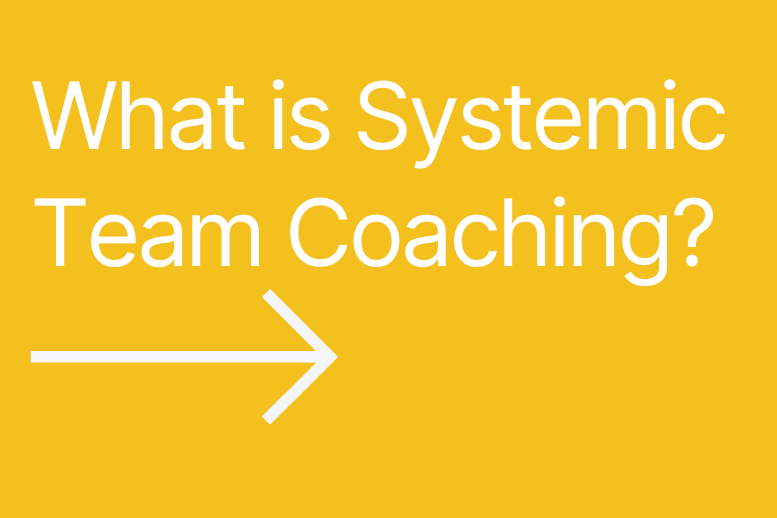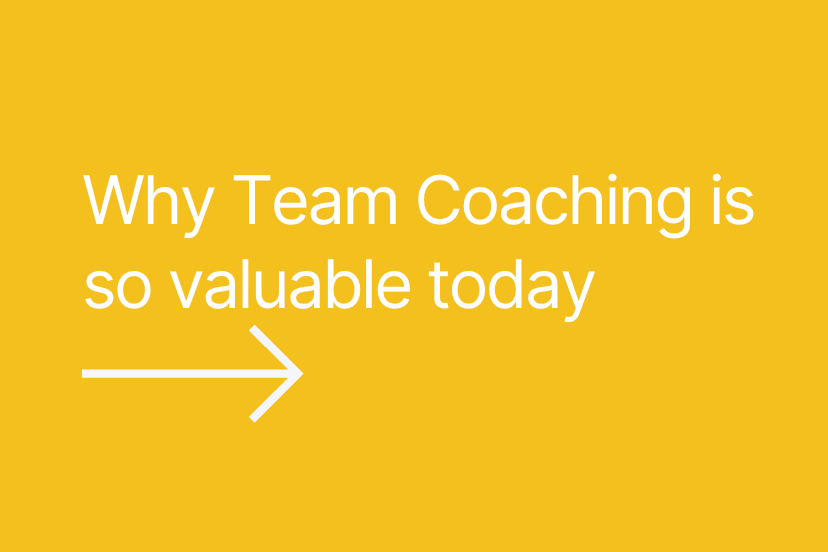
BLOG
Inspiration and news
What is Systemic Team Coaching?
You can coach brilliant individual leaders and still have a team that struggles to align, adapt, or deliver together. Here’s why Systemic Team Coaching is the missing link and why I’m training as a Systemic Team Coach.
Why the future belongs to teams that can think and act as connected systems, not just collections of talented individuals.
Picture this: A leadership team of capable individuals, each successful in their own right, sits in yet another strategy meeting that feels like it's going nowhere. They're debating the same priorities they discussed last month. Decisions get made, then somehow unravel in implementation. They're stuck in patterns that limit their collective impact.
Sound familiar? This scenario plays out in meeting rooms everywhere, and it points to a fundamental gap in how we develop leadership capability.
I’ve coached many brilliant leaders, founders and managers; coaching gives them space to pause, reflect, and reorient around what matters most, and it builds self-aware, confident and capable leaders.
But I’ve noticed something vital: traditional one-to-one coaching and leadership development aren’t enough. You can build brilliant individual leaders, and still end up with a team that struggles to align, adapt, or deliver impact across the wider business.
Organisations and teams are part of a complex system: customers, colleagues, board members, investors, stakeholders, and the political or economic climate. So if we want organisations to be successful, we need teams who can lead together, with clarity of purpose, shared ownership, and the ability to engage with the world around them.
The challenge isn't individual capability. It's that modern business challenges require systemic thinking and collective leadership that traditional approaches simply don't develop.
Systemic Team Coaching®
Systemic Team Coaching® shifts the focus from "How can we work better together?" to "What are we here to achieve together, and how do we engage with our wider ecosystem to make it happen?"
Why it matters now
We’re operating in a world that’s volatile, complex and fast-moving. Leaders are juggling competing priorities, navigating constant change, and doing more with less.
Remote and hybrid working has fundamentally altered how teams function. The informal conversations that once created alignment have disappeared. Teams need more intentional ways to stay connected, not just to each other, but to the stakeholders they serve.
Traditional team coaching is often focused on internal dynamics, things like roles, meetings, or communication. That still matters, but it’s not enough. Teams need to be thinking systemically:
Who are we here to serve? (Stakeholders)
Why are we here? (Purpose)
What value are we here to create?
What do our stakeholders need from us right now?
How do we need to work together and with others to deliver that value? (Collective performance)
What is Systemic Team Coaching?
Systemic Team Coaching® isn’t just about fixing team relationships or getting through a to-do list more efficiently. Instead of asking, “How can we get better at working together?” the team begins asking, “What do we exist to do and how can we lead together to do it well?”
It’s a shift that results in clearer priorities, greater ownership, stronger collaboration, and better decisions that are aligned to the needs of the business and the people it serves.
Peter Hawkins defines it as:
“A process by which a team coach works with a whole team, both when they are together and when they are apart, in order to help them improve both their collective performance and how they work together, and also how they develop their collective leadership to more effectively engage with all their key stakeholder groups to jointly transform the wider business.”
Outside In and Future Back Approach
Traditional team development works inside-out: start with team dynamics, then hope better internal relationships create better external outcomes. Systemic team coaching works outside-in and future-back.
Outside-In: Start with stakeholder needs and work backwards to team capability.
Future-Back: Begin with the future you're creating together, then align present actions
This approach fundamentally changes the questions teams ask:
Instead of: "How can we communicate better?" Ask: "What do our stakeholders need from us, and how do we need to communicate to deliver that?"
Instead of: "How do we resolve this conflict?" Ask: "What does this tension tell us about competing stakeholder needs, and how do we navigate that systemically?"
Instead of: "How do we make better decisions?" Ask: "What decisions would best serve our shared future and stakeholder ecosystem?"
The Five Disciplines of High-Performing Teams
The Five Disciplines Model, developed by Peter Hawkins, offers a practical framework for how systemic team coaching works. It supports teams to develop in five key areas:
Commissioning - Clarifying the team’s purpose and mandate, why it exists and who it’s here to serve.
Clarifying - Agreeing on roles, responsibilities, shared goals and success measures.
Co-Creating - Improving the quality of relationships, trust, communication and collaborative working within the team.
Connecting - Engaging with key stakeholders, internally and externally, to understand their needs and create real value.
Core Learning - Reflecting on performance and ways of working, and continuously learning together as a team.
Why I’m training in Systemic Team Coaching®
This year, I have noticed more clients who want to improve team effectiveness because of poor communication, lack of collaboration and accountability, low levels of psychological safety. So I’ve chosen to train in Systemic Team Coaching®, led by Professor Peter Hawkins and Renewal Associates. Although, I’d developed my own framework and programme for working with teams, I’m building on that to support whole teams to be more connected, aligned and impactful.
We support teams to explore their context and system: the organisation, the strategy, the customer, the stakeholders and the outside world. This involves:
Define or clarify their shared purpose and what they’re there to deliver
Strengthen trust, openness, and psychological safety
Surface and explore unspoken tensions or assumptions
Create better ways of working together
Engage with their stakeholders to ensure they’re adding the right kind of value
Hold each other to account in healthy, productive ways
Develop shared leadership, not just strong individuals
Build a team culture that reflects their values and supports results
This might involve a combination of workshops, team coaching sessions, one-to-one conversations, stakeholder input, and practical tools to embed learning between sessions. I draw on systemic team coaching principles, Peter Hawkins’ Five Disciplines model, and years of real-world experience working with leadership and cross-functional teams.
Let’s talk about your team
If you're curious about how Systemic Team Coaching could help your team become more connected, effective, and future-ready, let’s chat.
You can read more about my team effectiveness work here, or get in touch to explore what might be possible.
Email: polly@pollyrobinson.co.uk
Call: 07966 475195
Why Team Coaching Is What Organisations Need Today
Effective Teams create successful organisations. Why Coaching teams, not just individuals, is what organisations need today.
The missing piece in creating truly effective teams
We've become exceptionally good at developing individual leaders. Executive Coaching builds confidence and emotional intelligence, and Leadership Programmes develop strategic thinking. These investments do work for individual development.
But team performance isn’t simply the sum of the individual parts; it’s about how well people work together - how they collaborate, make decisions, and achieve together collectively what they couldn’t do on their own.
And that’s the gap: teams are often left to figure out collaboration, clarity, trust, and accountability on their own. We assume teamwork will just happen, especially if the individuals are skilled.
But what I see is that you can have a group of brilliant people, but they still struggle to function as an effective team.
Individual excellence is important. But team effectiveness is what drives outcomes.
In most organisations, the most critical work is done in teams, whether that’s a senior leadership team, a product or project team or a cross-functional working group. But without being intentional, teams easily find themselves:
Working in silos
Second-guessing each other
Avoiding tricky conversations
Struggling to make decisions
Dropping the ball on shared goals
Complex Systems
Today, teams operate in increasingly complex systems, including balancing the needs of multiple Stakeholders from customers, employees, investors, and communities. The VUCA (Volatile, Uncertain, Changeable and Ambiguous) environment means teams need to sense, adapt, and respond together faster and under more pressure than ever before.
The Hidden Barriers to Team Effectiveness
Through my work with leadership teams and cross-functional groups, I've identified five critical barriers that consistently undermine performance:
1. Unspoken Assumptions
Teams operate on unstated assumptions about purpose, priorities, and process. A leadership team I worked with discovered they had three different interpretations of their strategic priorities. No wonder they felt fragmented.
2. Reluctance to share ideas and be honest.
Many teams avoid difficult conversations, dance around tensions, and make pseudo-decisions that unravel in implementation. Building Psychological Safety helps teams to engage in healthy and constructive dissent.
3. Working in Silos
This needs no explanation - silos create internal competition and misaligned priorities.
4. Not sharing and collaborating
Teams make decisions with incomplete information because they don’t collectively gather and share knowledge - this is particularly common in hybrid and remote teams.
5. Being Busy Fools
Most teams are too busy moving from one project or task to the next without taking time to explore what went well, what needs improving. This leads to repeating ineffective habits or practices.
Why team coaching?
Team coaching isn't a training programme or team building exercise. It’s a systemic approach that gives teams space, structure and support to:
Align around shared purpose and goals, improving collaboration, accountability and results.
Understand how they’re experienced by stakeholders (customers, suppliers and colleagues).
Navigate complexity and interdependence
Improve psychological safety, trust, feedback, and communication.
Strengthen their impact on the wider system they’re part of.
This is especially important in today’s world, where most challenges can’t be solved by one person, one team, or one department alone.
Organisations are systems.
When we say organisations are systems, we mean they are interconnected, dynamic, and constantly evolving. What happens in one area affects another, sometimes in obvious ways, often in hidden ones.
A decision made in HR ripples into Finance. A tension in one team affects how another communicates. A disconnect between the board and delivery teams shows up in morale, trust, or results.
Systemic team coaching helps teams understand these connections so they can operate more effectively within their team and between other teams and stakeholders. It brings the “outside in” and encourages teams to think beyond their function or agenda.
I’ve worked with teams navigating growth, restructuring, service pressures, or new leadership. Often, they’re not struggling because they don’t care or aren’t capable; they’re struggling because no one’s created the space for honest conversations, shared clarity, and team learning.
Team coaching changes that.
We start with where the team is now. We look at what’s working and what’s getting in the way. And we co-create new ways of working that improve trust, decision-making, and delivery. Over time, I’ve seen teams:
Reset after change
Strengthen cross-team relationships
Improve communication and meeting culture
Clarify roles, purpose, and priorities
Reconnect with the bigger picture and their stakeholders
Do we need Team Coaching?
If you’re part of a team, or managing one, that’s facing complexity, change or growth or if your team is experiencing any of these patterns, team coaching could be what you need.
Individual performance is strong, but collective results are inconsistent
Decisions take too long or get revisited repeatedly
Stakeholder feedback suggests disconnection or misalignment
Team members feel frustrated with collaboration
Change initiatives stall in implementation
There's a sense the team could achieve more together
How Growth Space can help
We have developed a framework for Systemic Team Coaching (inspired by Patrick Leconi and Professor Peter Hawkins). A Team Coaching programme typically involves 4-6 sessions over a few months. It’s a chance for teams to:
Reflect on how they work together
Surface and shift unhelpful patterns
Build trust and psychological safety
Align behind shared goals and behaviours
Strengthen their collective leadership across the wider business
We use practical frameworks including Team Charters, personal user manuals, role clarity tools, and create a safe, structured space for honest conversation and inclusive facilitation where everyone has a voice.
Get in touch to chat about your team and how Team Coaching could help:
Email: polly@pollyrobinson.co.uk
Call: 07966 475195


